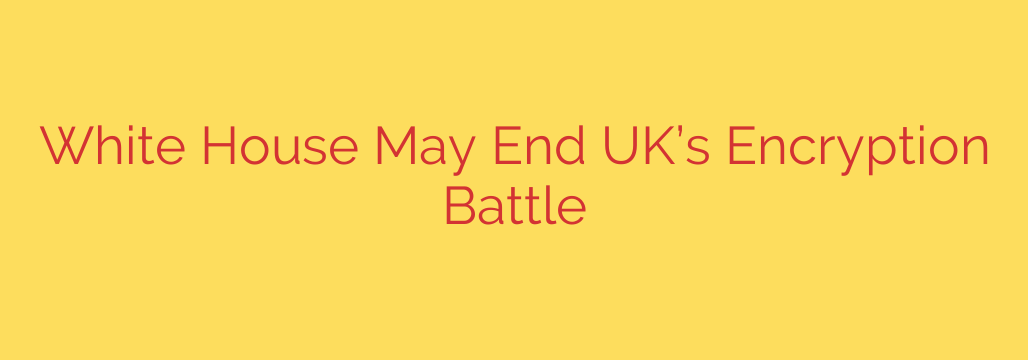
US Intervenes in UK’s Controversial Plan to Scan Private Messages
The privacy of your digital conversations is at the center of a high-stakes international debate. A controversial piece of UK legislation, known as the Online Safety Bill, is pushing for powers that could fundamentally undermine the end-to-end encryption that protects messaging apps like WhatsApp, Signal, and iMessage. Now, the White House has reportedly stepped into the fray, signaling a major turning point in the global battle for digital privacy.
At the heart of the issue is the UK government’s desire to compel tech companies to scan user messages for illegal content, specifically child sexual abuse material (CSAM). While the goal is commendable, security experts and tech companies have consistently warned that there is no way to do this without breaking the very foundation of secure communication: end-to-end encryption.
The Encryption Dilemma: Security vs. Surveillance
End-to-end encryption ensures that only the sender and the intended recipient can read a message. Think of it as a digital sealed envelope. Not even the company that runs the service (like Meta for WhatsApp) can see the contents.
The UK’s proposal would force these companies to find a way to peek inside that sealed envelope.
- The Government’s Stance: Proponents of the bill argue it is a necessary tool to protect children and fight serious crime. They believe technology should not provide a haven for criminals to communicate without oversight.
- The Tech Industry’s Warning: Tech companies and cybersecurity experts argue that this is technically impossible without creating a major security flaw. This move would require tech companies to build a ‘backdoor’ into their services, which could then be exploited by criminals, hackers, and hostile foreign governments, putting everyone’s data at risk.
Several major platforms, including WhatsApp and Signal, have stated they would rather cease operations in the UK than compromise the security of their global user base.
Why is the White House Getting Involved?
The reported intervention from the US government is significant. Because many of the world’s largest technology companies are based in the United States, a UK law that weakens encryption would have massive international consequences.
The primary concern is that a UK-mandated ‘backdoor’ would set a dangerous global precedent. If a democratic nation like the UK can force companies to weaken security, it becomes much harder to refuse similar demands from authoritarian regimes around the world. This could erode digital security and free speech on a global scale.
Furthermore, US officials are likely concerned about the security implications for American citizens and government personnel who rely on these encrypted services for secure communication. A vulnerability created for one government is a vulnerability for all.
You Can’t “Safely” Break Encryption
The core technical challenge remains unsolved. The idea of “client-side scanning”—where messages are scanned on a user’s device before being encrypted and sent—has been proposed as a solution. However, experts warn this is simply a more sophisticated backdoor.
Such a system would essentially install surveillance software on every user’s phone. It would be a prime target for abuse and would fundamentally alter the trust between users and their personal devices. As one expert put it, you cannot have a system that is secure for most people but accessible to a select few. Security, by its nature, is absolute. Once it’s broken for one purpose, it’s broken for all.
What This Means for Your Digital Security
This ongoing debate is not just a political or technical squabble; it has direct implications for your personal privacy and data security.
- The Integrity of Your Private Conversations: The outcome will determine whether the messages you send to family, friends, and colleagues remain truly private.
- The Security of Your Data: Weakening encryption standards makes your personal and financial information more vulnerable to hackers and fraud.
- Global Precedent: The UK’s decision will influence how other countries, including those with poor human rights records, approach digital surveillance.
As this situation develops, it’s a crucial reminder to prioritize your own digital hygiene. Always use apps that offer end-to-end encryption by default, enable two-factor authentication on all your accounts, and stay informed about legislation that could impact your digital rights. The future of private, secure communication may depend on the outcome of this international standoff.
Source: https://go.theregister.com/feed/www.theregister.com/2025/08/12/could_the_white_house_put/








